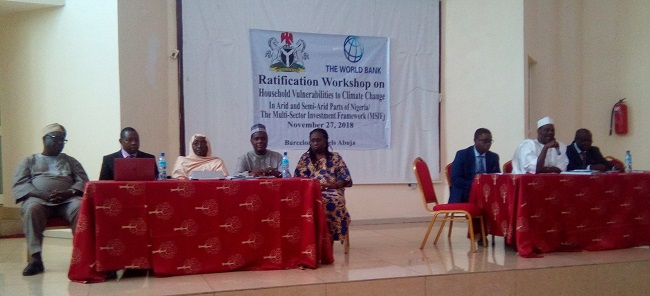With motions raised (and supported by participants) by Prof. Daniel Gwary of the University of Maiduguri and Mr. Sunday Gadzama, the Borno State Environment Commissioner, three reports aimed at addressing climate variability adaptive capacities of Nigerians were on Thursday, November 28, 2018 officially validated, albeit subject to observations and corrections.

The World Bank, in collaboration with the Federal Ministry of Environment, commissioned a study on “Household Vulnerability to Climate Change”, developed a “Multi-Sector Investment Framework (MSIF)” as well as an “Assessment and Analysis of Economic Cost of Land Degradation and Hotspot Mapping” for a range of sectors in the arid and semi-arid areas of Nigeria.
Climate change, according to a broad scientific consensus, is a challenge that is likely to happen more quickly than what was expected some years ago. Human activities, primarily the burning of fossil fuels and clearing of forests for agricultural and other purposes, are said to have intensified the natural greenhouse effect, thereby leading to global warming.
In arid and semi-arid (dryland) parts of Nigeria, extreme weather events such as drought, desertification and heat waves are said to be occurring in greater frequencies and intensities. This apparently influenced the initiative, in respect of which a two-day (November 27 to 28) validation workshop held in Abuja.
Dr Amos Abu of the World Bank Nigeria Country Office said: “It is a joint World Bank and Federal Government effort and we are into it because it is one of the priority areas that have been identified by the government and, as a good partner, we are working with them to having clarity as it pertains to the cost of environmental degradation in Nigeria. This will help inform policies, it will also help in better targeting and also prioritisation and sequencing.
“Because the primary focus of the World Bank is to eliminate extreme poverty while boosting shared prosperity, the need to know where the poor live and their vulnerabilities to changing environment and extreme weather events cannot be over-emphasised if we are actually to addressing their concerns and situation. Therefore, we are very happy to be partnering with the Federal Government in carrying out these three important studies, respectively dealing with mapping of housing vulnerabilities in arid and semi-arid parts of Nigeria, the multi-sector investment framework for addressing climate change issues and for building communal resilience and sector resilience, as well as costing and mapping of degraded hotspots in Nigeria.
“These are really study diagnostics that will help inform policy in a very practical and poignant manner, and thus we also see that it will help in sequencing, and also give a sense of priority and then gross our attention to what will happen in a do-nothing scenario. So, this is a decision support tool that these new studies have thrown up and we are going to take it further.”
Prof. Olukayode Oladipo, who produced two of the reports, said: “The report is to help and guide the World Bank in identifying critical areas of intervention that can make the arid and semi-arid regions of northern Nigeria to be more climate resilient and sustainably developed by looking at how vulnerable the region is to climate change and climate variability, and which particular areas within the region is extremely vulnerable not only in terms of the climatic elements, but in terms of the socio-economic dimensions the people are living and surviving under increasingly threatening climatic conditions.
“The other aspect is how degraded is the area in terms of loss of biodiversity, erosion, deforestation, and what is it costing if we do nothing and allow the spate of degradation to continue. By having this particular information now, the World Bank will now look and identify immediate areas of need that can reduce the rate of degradation, increase the resilience of the people to changes in climatic conditions, and enable them to make a living in a more sustainable manner from the area, rather than continuously complaining that the area is arid or semi-arid and that it is not working, is not the best.
“So, in short, it is an information-gathering and data-generating system to enable the World Bank to look at the potential areas of investment that the World Bank can support and bring about positive development in the concerned areas or regions.”
The goal of the “Household Vulnerability to Climate Change in Arid and Semi-Arid Northern Nigeria” report, according to Prof. Oladipo, is to carry out vulnerability mapping to underpin development of a pragmatic framework for climate resilient development activities in the agriculture and forest sectors, taking into consideration activities in water resources, irrigation and energy to ensure an integrated approach to building landscape resilience.
The “Multi-Sector Investment Framework (MSIF) for Climate Resilience in Nigeria”, he added, stresses that massive investment is required to build the country’s resilience to climate risks and to safeguard its natural capital in the light of increasing climatic variability that is expected to affect the area.
Mamoud Bello Abubakar, who prepared “Assessment and Analysis of Economic Cost of Land Degradation and Hotspot Mapping in Arid and Semi-Arid Region in Nigeria”, disclosed that the study assessed and analysed the extent of land degradation hotspot, drives (causes) and its economic cost.
“It also analysed the determinants of land degradation and sustainable land management in the six states of northern Nigeria (Borno and Sokoto in the Semi-Arid Zone, Adamawa and Kano in the Sub-Humid Zone, and Niger and Kogi in the Humid Zone),” he added.
